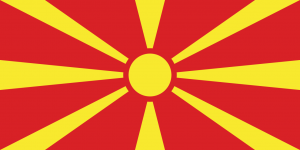Language/Macedonian/Grammar/Adjectives
Hi Macedonian learners! 😊
In this lesson, we will dive into the wonderful world of adjectives in the Macedonian language. Adjectives are an essential element of any language and can really help you express yourself more fluently.
Finish this lesson and explore these related pages: Pronouns, Negation, Personal Pronouns & Feminine.
What are adjectives?[edit | edit source]
Adjectives are words used to describe or modify nouns or pronouns. They give information about the quality, size, color, number, and shape of the noun. For example:
| Macedonian | Pronunciation | English |
|---|---|---|
| дебел | débel | fat |
| мала | mala | small |
| црвен | tsrven | red |
In the examples above, the adjectives are describing the qualities of the noun.
Adjective Placement[edit | edit source]
In Macedonian, adjectives usually come after the noun they describe. For example:
- зграда креативната (zgradá kreatívnata) = the creative building
Here, креативната (kreativnata) comes after the noun зграда (zgrada) it is modifying.
However, there are some cases where adjectives come before the noun, such as when they are emphasizing how large or small something is:
- голем дом (gólem dom) = big house
- мал джеп (mál dzhep) = small pocket
Agreement of Adjectives[edit | edit source]
In Macedonian, adjectives must agree with the noun they are describing in gender, number, and case. For example:
| Macedonian | Pronunciation | English |
|---|---|---|
| зелена машина | zeléna máshina | green car (feminine singular) |
| зелени книги | zeléni knigi | green books (feminine/masculine plural) |
In the examples above, the adjective зелена (zelena) agrees with the gender and number of the noun машина (mashina) and the adjective зелени (zeleni) agrees with the gender, number, and case of the noun книги (knigi).
Comparison of Adjectives[edit | edit source]
There are three degrees of comparison in Macedonian adjectives:
- Positive – describes one thing
- Comparative – compares two things
- Superlative – compares more than two things
To form the comparative degree, we usually add the suffix -ија (-ija) to the root form of the adjective. For example:
- мал (mal) - small
- помал (pomal) - smaller
To form the superlative degree, we usually add -ест (est) to the root form of the adjective. For example:
- долг (dolg) - long
- најдолг (najdolg) - longest
It's important to note that there are some irregular adjectives that don't follow the above pattern, such as добар (dobar) - good, which becomes подобар (pоdobаr) - better and најдобар (najdobar) - best.
Examples in Context[edit | edit source]
Here is a dialogue between Ana and Milan where they use adjectives in context:
- Ana: Здраво Милане, како си? (Zdravo Milane, kako si?) - Hi Milan, how are you?
- Milan: Сум одлично, благодарам. А ти? (Sum odlichno, blagodaram. A ti?) - I'm great, thanks. And you?
- Ana: Сум добро, фала. Имам новa книга. (Sum dobro, fala. Imam nova kniga.) - I'm good, thanks. I have a new book.
- Milan: Звучи интересно. Која книга? (Zvoochi interesno. Koja kniga?) - Sounds interesting. Which book?
- Ana: Мени многу ми се допаѓа. Една зелена книга за патувања. (Meni mnogu mi se dopagja. Edna zelena kniga za patuvanja.) - I really like it. A green book about travel.
Practice Makes Perfect[edit | edit source]
Practice makes perfect! Now that you have learned some basic rules about adjectives in the Macedonian language, it's time to practice your skills. Explore Polyglot Club and find native speakers to speak with. Don't be afraid to ask them any questions.
To improve your Macedonian Grammar, you can also check out our lessons and articles. 📚
➡ If you have any questions, please ask them in the comments section below.
➡ Feel free to edit this wiki page if you think it can be improved. 😎
Other Lessons[edit | edit source]
Sources[edit | edit source]

